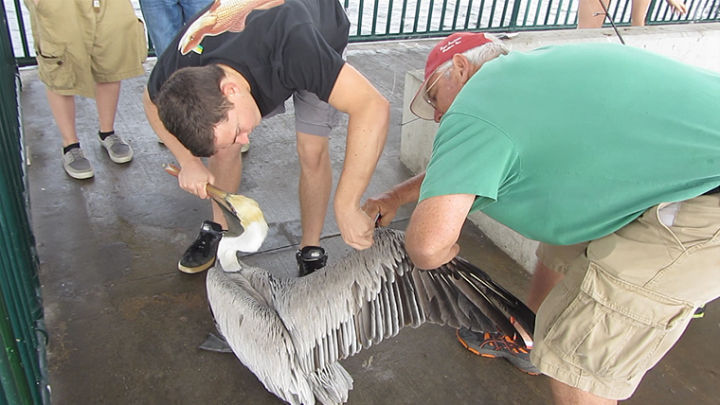VERO BEACH — As others watched with concern, James Morton jumped into action to help save a pelican from drowning or further injuring itself.
A handful of anglers were fishing under the Barber Bridge with manatee, sea otter, and pelicans all around as they cast for a bite. But, the scene of an entangled pelican caused a call to 911 and a rescue attempt.
Scott Deyoe was fishing with his grandson when a pelican swooped down after his bait they were fishing with and got caught up in his line. The bird couldn’t free itself.
So, Deyoe reeled it in. But, as he brought in the line the pelican continued to go under the water.
“These birds frequently spend time looking for an easy meal at piers and other fishing hotspots,” according to the Florida Fish and Wildlife Conservation Commission. “They are often hooked accidently as they try to grab bait off an angler’s line.”
When Deyoe got the bird to the pier, that’s when Morton jumped the railing and brought the pelican up by the beak, which was no easy task in itself. It took several tries as Morton grabbed for the bird and tried to keep from getting bit.
Once Morton grabbed the beak he was able to bring the bird from the water up to the pier. There, Deyoe and Morton saw the bird was not hooked, but entangled. They were able to free the bird.
After it was freed, they all backed away and it flew away.
A Vero Beach Police Officer did arrive to check on the scene. No one from animal control was available, said a 911 dispatcher.
After the break from fishing, anglers got another surprise. Another pelican, this time caught in Morton’s line, after he already freed one earlier that day. This time, Morton was able to free the bird with a few flicks of his rod.
Morton had done this before, he said after the first rescue. Once you get ahold of the beak you can control the pelican, according to Morton.
“We often find pelicans that died as a result of monofilament line entanglements hanging from trees and other vegetation,” said FWC regional biologist Ricardo Zambrano. “These birds often suffer for days before succumbing to injury or starvation.”
Vero Beach Animal Control Officer Bruce Dangerfield recently responded to two pelicans that had tried to eat catfish heads and got them lodged in their throats.
The hardest thing about rescuing a pelican is that they can still fly, Dangerfield said.
Dangerfield is on call Monday through Friday 8 a.m. – 4 p.m. during off hours, he suggests calling the non-emergency number, (772) 978-4600 if you are in Vero Beach, for the county, (772) 569-6700, Sebastian, (772) 589-5233, and Fellsmere, (772) 646-6309.
Dangerfield suggests trying to get help first before attempting to rescue the animal yourself, if you feel comfortable enough to make such an attempt.
The FWC has these tips to keep wildlife safe:
- Properly dispose of monofilament line. If you have unwanted line, store it safely and securely until it can be placed in a recycling bin.
- Don’t leave fishing line unattended, as pelicans may be tempted to steal your bait.
- Avoid casting near trees, utility lines and other areas where your line may get caught.
- Check your tackle frequently for frayed line that may easily break.
- Do not feed pelicans or other wildlife, since it encourages them to approach fishing boats, piers and anglers. If available, use fish-scrap repositories. If they are not available, discard your fish scraps in a garbage can or at home.

